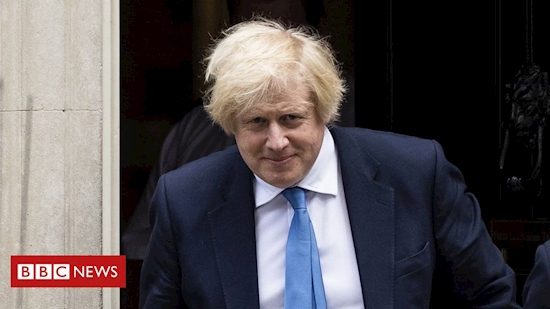Coronavirus: Cinemas and museums set to reopen in England from 4 July
Cinemas, museums and galleries will be able to reopen in England from 4 July, Boris Johnson is expected to announce on Tuesday as he outlines a further easing of coronavirus restrictions.
Venues closed since the middle of March will be able to welcome visitors as long as safety measures are in place.
The PM is also due to set out how pubs can safely reopen following a review of the 2m distancing rule.
Health Secretary Matt Hancock said on Monday the virus was "in retreat".
Mr Hancock said England was "clearly on track" to further ease lockdown restrictions but No 10 warned the moves would be reversed if they led to a surge in new infections.
There were fewer than 1,000 confirmed new cases on Sunday, the lowest daily figure since the lockdown started on 23 March, while the number of people in hospital with the virus has fallen below 5,000.
The number of daily virus deaths also fell to 15, the lowest since 15 March. However, the figures often dip on Mondays due to reporting delays.
On Monday, the prime minister discussed the changes with the Covid-19 strategy committee, attended by the UK's chief scientific adviser Sir Patrick Vallance and England's chief medical officer Professor Chris Whitty.
He is expected to announce the plans in Parliament at about 12:30 BST.
Mr Johnson is expected to say the 2m (6ft 6in) social distancing rule will be reduced to 1m (3ft 3in) from 4 July, with some mitigating measures.
This will enable many pubs, restaurants, hotels and B&Bs to reopen for the first time in more than three months.
Current evidence suggests being 1m apart carries between two and 10 times the risk of being 2m apart, scientists advising the government say.
Boris Johnson's words today will represent more than a different notch on a measuring tape, more than another kind of business being able to open its own doors in England, and more than the government moving into the final official phase of its so called roadmap set out weeks ago.
Coronavirus has bestowed grief on tens of thousands of families and is bringing recession to the whole UK.
And it has also pushed the capabilities of the Westminster government, arguably, beyond its limits - buffeting ministers' reputations and raising questions about their grip.
Now with the threat to health receding, and the economic danger very real, the political calculus has moved enough to allow the next phase to begin.
Ministers used to boast they were following the science. But that complicated advice was a guide, never a medical diktat.
The decisions on how and when to react to the pandemic were always for the politicians to take.
The government's ambition now is to move steadily towards a more recognisable way of life that gives a chance, ministers hope, to give them, not the virus itself, control.
Read more from Laura here.
The government has come under pressure from the hospitality sector, and some Conservative MPs, to relax the 2m rule, with many saying it would be impossible to trade under the current measures.
Labour said its support would depend on employees having adequate protective equipment, such as face shields, and there being an effective testing and tracing system in place.
Ministers have not ruled out customers having to register when entering pubs and bars so they can easily be tracked down if they come into contact with a person infected with coronavirus.
Peter Borg Neal, chief executive of pub chain Oakman Inns, told Radio 4's Today programme that 1m social distancing was "still very problematic" but would allow most pubs to open.
"We hope to prove very quickly to government that pubs will be a safe environment and they can ease restrictions further in due course," he said.
As part of the government's recovery plan, some arts and entertainment venues are also likely to be able to open their doors from 4 July but only if they follow guidance to ensure they are "Covid secure".
They will be expected to minimise face-to-face contact by requiring customers to pre-book tickets, to stand in spaced queues and to enter and leave through different areas.
Screens could be put up to minimise the risk to staff while ventilation systems will be improved.
Linda Bauld, professor of public health at the University of Edinburgh, said the public health community was "very anxious" about the pace of changes, adding that the UK still has a far higher number of cases than other European countries.
"I don't think we're in the position where we have a fully functioning track and trace [system] to give us the confidence that if we start to see cases rise again we can contain it," she told the BBC's Newsnight programme.
In his Commons statement, Mr Johnson will reiterate pledges to use the NHS Test and Trace system to detect and control local outbreaks through "targeted lockdowns".
A No 10 source said the government would "not hesitate to reverse these steps" if it is necessary to stop the virus running out of control.
The other nations of the UK are yet to announce any plans to change the 2m distance rule.
Scottish First Minister Nicola Sturgeon has asked scientific advisers to review the circumstances in which it might be reduced alongside "additional mitigations".
In Northern Ireland, where hotels, bars, restaurants and cafes are set to reopen from 3 July, Economy Minister Diane Dodds has said she is open to changing it. Schools will be able to follow 1m social distancing measures when they reopen in August.
A change has also not been ruled out in Wales - where First Minister Mark Drakeford said he would support a reduction if Welsh advisers said it was safe.
The World Health Organization recommends a distance of at least 1m.
In other developments:
Source: www.bbc.com

